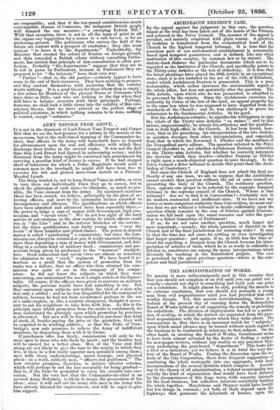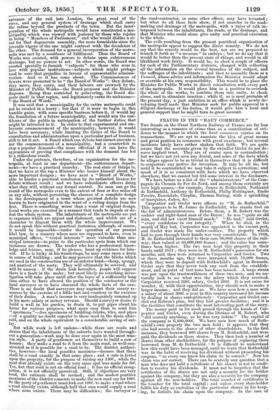THE ADMINISTRATION OF WORKS.
No maxim is more indiscriminately used in this country than that you should not complain of an evil until you can point out a remedy—should not object to something bad until you can point out a substitute. It might almost be said, pushing the maxim to its extreme conclusion, that you should not persuade a young man from evil acquaintances until you had provided him with worthy friends. Yet, this maxim notwithstanding, there is a fashion at the present day of running down the Metropolitan Board of Works without at all suggesting the remedy or providing the substitute. The division of employments has led to a profes- sion of writing, in which the writers are separated from the prac- tical acquaintance with the subjects which they write about. The consequence is, that there is an incessant watch for " subjects," upon which smart phrases may be turned without much regard to the business to be conducted in reference to that subject. On the other hand, in creating the Board of Works, Government seems to have been almost actuated by the desire of finding a subject for newspaper-writers, without any reality or any practical busi- ness underlying the pasteboard " department." This looks like a libel or a caricature, yet we believe it is in brief the very his- tory of the Board of Works. During the discussion upon the re- form of the City Corporation, there were frequent suggestions of combining the whole metropolis into one aggregate, with local incorporations of the several districts which compose it. Accord- ing to the theory of all administration, a federal municipality was exactly the kind of organization that would have been dictated by the circumstances of this huge town, with separate interests for the local business, but collective interests essentially binding the whole together. Marylebone and Stepney could have locally but few things in common ; yet both of them depend upon the highways that permeate the labyrinth of houses, upon the
en
trance of the rail into London, the great road of the river, and any general system of Lainage which shall carry the refuse beyond the precihets of the town. But the incor- poration of the whole metropolis would have constituted a mu- nicipality which was viewed with jealousy by those who rejoice in being " Members of Parliament,' and who would dislike a ri- val for that degenerate assembly, the more formidable since the juvenile vigour of the one might contrast with the decadence of the other. The demand for a general incorporation of the metro- polis was met by a semblance of fulfilment. - Thus the Board of Works was created, with powers to debate upon subterranean drainage, but no powers to act. In other words, the Board was created specially to furnish " subjects " for those who were in love with popular institutions—subjects which might perhaps tend to cure that prejudice in favour of representative adminis- tration. And so it has come about. The Commissioners of Sewers were promoted to be " the Board of Works "; they debate, they move, they carry, and their labours are crowned by the Minister of Public Works—the Board proposed and the Minister disposes. Being thus restricted to palavering, the Board dis- ports itself in that region, and legitimately earns its nickname- " the Board of Words."
It was said that a municipality for the entire metropolis could not be created in a hurry ; but that if it were to begin in this humble guise, with some specific business before it, it would lay the foundation of a future municipality, and would win the con- fidence of the public in anticipation of the further duties that might be intrusted to it. In order to that experimental and em- bryonic commencement of the municipality, however, it would have been necessary, while limiting the duties • of the Board to consultation and administration upon a particular part of business, still to let it act. A Board which can debate but cannot execute is not the commencement of a municipality, but a counterfeit to stop a popular demand—the more effectual if it can have the appearance of proving that compliance with the demand has led to a ridiculous result.
Under the pretence, therefore, of an organization for the me- tropolis, at least in one department—the subterranean depart- ment—we have a practical anarchy. The real state of things is, that we have at the top a Minister who busies himself about the more important designs ; we have next a "Board of Works," able to hinder a practical conclusion by its unlimited licence for debate without result ; and we have subordinate officers doing what they will, without any formal control. No man can go the round of the metropolis even to the extent of four or five miles iles off on any side, without perceiving the absence of a complete design in the development of a town whose greatest defects are now known to have originated in the want of a ruling design from the first. There is something worse than a want of original design. Local works are executed in a manner that tends to impede or de- feat the whole system. The inhabitants of. the metropolis are put to expenses which are unjust and dishonest, and which are of a character to disgust them with the whole improvement. We do not speak this without practical instances, although, of course, it would be impossible—under the operation of our present libel law, in a country where men are supposed to have, even in municipal offices, "vested interests" more valuable than mu- nicipal interests—to point to the particular spots from which our instances are drawn. The reader who has a professional know- ledge and leisure, may, if he pleases, hunt up evidence for him- self. If he is lucky in his wanderings, he may come upon a drain in course of building ; and he may perceive that the bricks which are used in the construction are of an inferior kind—cheap, spongy, and nastiest of. the nasty. They will ultimately be covered, and will be unseen : if the drain leak hereafter, people will suppose there is a fault in the make ; but most likely no searching inves- tigation will take place until after the lapse of a sufficiently long time either to have altered the position of the contractor or the local surveyor or to have obscured the whole facts of the case. There is no doubt that surveyors may augment their scanty re- sources by the exercise of a little tact and courtesy in the exercise of their duties. A man's income is very inadequately summed up in his mere salary or money revenue. Should a surveyor desire to build a wall in his garden, to drain it, to put pipes about his house for various purposes, what more easy than to send him " specimens "—free specimens of building-bricks, tiles, and pipes —of a quality no doubt superior to those used in the drain afore- said, and on the whole equivalent to a considerable saving of out- lay. But while work is left undone—while there are roads and drains that the inhabitants of the suburbs have wanted through- out a generation—work may be done over again in the most wan- ton style. A party of gentlemen set themselves to build a row of houses ; they make a road to it from the main road, as well-con- structed as it is possible for a road to be. The district authori- ties, however—the local pontifex maximus—decrees that there shall be a road exactly in that same place ; and a rate is levied upon the property, for the purpose of raising say 1501., while the road that already exists on the very same spot was made for 501. Yes, but that road is not an official road ; it has no official recog- nition, it is not officially perceived.. Still, if objections are very loud, the estimate shall be revised ; and the modest pontifex maximus of the district consents to make the new road say for 1001. So the party of gentlemen must fork out 1001. to make a road where a road already exists, although half that sum would supply a road where none exists. There may be difficulties; the surveyor or the road-contractor, or some other officer, may have levanted ; but what do all these facts show, if not anarchy in the road- making and drainage of the metropolis, with a layer of talk in- terposed between the inhabitants, the roads, or the drainage, and that Minister who could alone give unity and practical execution to the whole.
The evils resulting from the present pontifical organization of the metropolis appear to suggest the direct remedy. We do not say that the remedy would be the best, nor are we prepared to launch it forth as a measure" in embryo ; but we do say that it would be better than the present state of things, and would in all likelihood work fairly. It would be, to elect a couple of officers for each of the Parliamentary districts, charged with collecting all the information on the several branches of the subject, and the suffrages of the inhabitants ; and then to assemble them as a Council, whose advice and information the Minister would adopt or override at his own responsibility. This would be to place the Minister for Public Works in direct consultation with every part of the metropolis. It would place him in a position to overlook the whole of the works, to combine them into unity, to check abuse, and to stimulate inaction ; while if, as is most probable at the present day, a just ambition in an office which is newly de- veloping itself made that Minister seek for public approval in a diligent discharge of his duties, it would give him a local and general support that he might turn to great account.



























 Previous page
Previous page